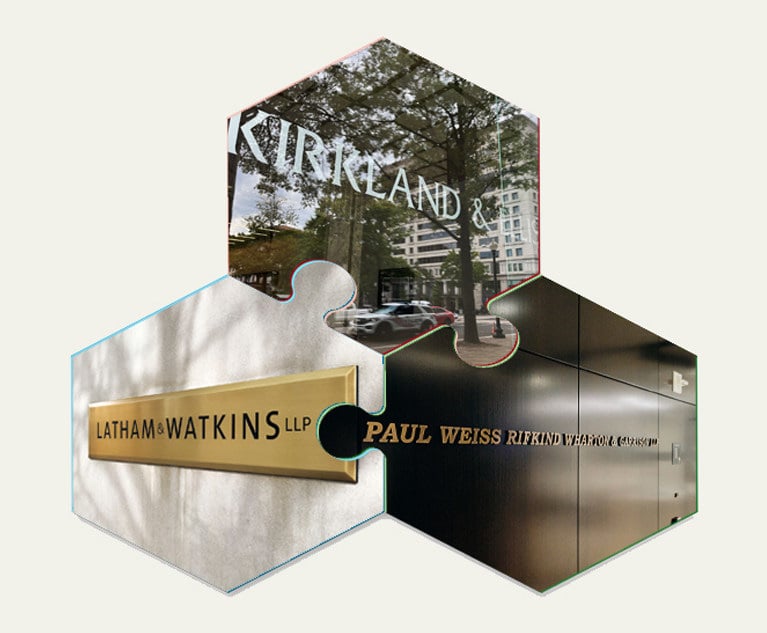Why buyout firms are becoming more attractive clients than banks
Power shift sees private equity firms now selecting legal advisers for the banks
February 06, 2019 at 12:01 AM
5 minute read
There was once a time when banks controlled not only their own legal spend but also much of the legal budget of the corporates they worked for. How times are a-changing.
Back in those days, it was not uncommon for banks advising a company on a transaction, such as an initial public offering, to say they would help select a law firm to advise the company. Firms with strong connections to the banks – such as the magic circle – benefited hugely as they were instructed on major deals despite sometimes having no previous connection to the client.
In time, the legal departments of corporates became more sophisticated and began taking more control over their own advisers. Few would have predicted, however, that the balance of power is beginning to tip the other way.
In recent years, banks have found themselves on the receiving end of a tactic they once employed. They were once the masters of the legal appointments on leveraged buyouts, but now private equity firms are increasingly dictating to the banks which law firms they are to use. That means on a buyout, a law firm acting for a major lending bank will have been selected by the buyout firm, not the advising, according to finance and private equity partners.
On one level this makes sense. Private equity firms buying a company typically pay the legal bills of the bank that finances the deal, so it is only fair that they have some control over who is appointed, say private equity lawyers.
Banks are increasingly losing in the power battle over the appointment their own legal advisers
And yet the modern phenomenon has gained such traction that top finance lawyers are now privately questioning whether UK regulator the Competition and Markets Authority should investigate. Banks are increasingly losing the power battle over the appointment of their own legal advisers. And that holds potential conflict implications: if the bank's legal advisers think of the buyout firm as the ultimate client, they could feel pressured into drafting less favourable terms for the bank.
It will come as no surprise to anyone that buyout firms are valuable clients, but this change means the influence they have in legal spending is even more significant than first thought. They are essentially controlling much more legal spend than ever before and are awarding mandates in finance as well as M&A. And this is in addition to all the other legal roles these clients offer access to. When a buyout firm starts to make changes to a portfolio company, its law firm has a good chance of winning refinancing, tax and employment work. If things don't go so well, the same law firm is in a good position to secure the restructuring mandate too. And when the company is finally sold, the law firm might also win it as a new client.
Despite their relatively small size, this constant stream of mandates means that buyout firms account for between a third and half of corporate revenues at the top private equity law firms, according to partner estimates.
Granted, the legal spend of banks is still far bigger than that of any buyout firm, even though that spend is spread across panels that can consist of dozens of law firms. In private equity, significantly fewer share the spoils.
This is partly because of the way that buyout firms instruct their legal advisers, especially in Europe. Partners say firms such as CVC Capital Partners and Apax Partners have decentralised ways of working that allow partners and principals within the fund manager's deal teams to instruct external counsel, sometimes with little involvement from the legal team, though the buyout firms are tight-lipped on how this works.
But the process may effectively rob other law firms of any readily identifiable individual to pitch to. The sector is pretty much a closed market, with only a relatively small number of partners having the key relationships with the range of financial dealmakers necessary.
For law firms keen to build links with such buyout firms, there are not many options available. They can go out of their way to attract well-connected partners with huge sums of money – an approach adopted by the likes of Kirkland & Ellis, Latham & Watkins and White & Case – but hefty financial packages are not easy to offer unless you have sufficient scale and profitability.
Those without this may find it easier to simply focus on hiring slightly more junior lawyers. Don't be surprised if junior partners and senior associates at the best buyout adviser practices are the next poaching ground.
But both strategies will take time to bear fruit. Those already advising buyout firms are likely to be assured of a lucrative income stream for some time to come. Top advisers to banks, beware.
Photo credit: iStock/faithiecannoise
This content has been archived. It is available through our partners, LexisNexis® and Bloomberg Law.
To view this content, please continue to their sites.
Not a Lexis Subscriber?
Subscribe Now
Not a Bloomberg Law Subscriber?
Subscribe Now
NOT FOR REPRINT
© 2025 ALM Global, LLC, All Rights Reserved. Request academic re-use from www.copyright.com. All other uses, submit a request to [email protected]. For more information visit Asset & Logo Licensing.
You Might Like
View All
As American Firms Retreat, Will Loyal UK Firms Regain Asia Market Share?

DeepSeek’s AI Power Move: Will Lawyers Be the Next to Adapt or Perish?
6 minute read
Now That the Trump Era Has Begun, Change Is Coming. For Big Law, Change Is Already Here
6 minute readTrending Stories
- 1Investor Sues in New York to Block $175M Bitcoin Merger
- 2Landlord Must Pay Prevailing Tenants' $21K Attorney Fees in Commercial Lease Dispute, Appellate Court Rules
- 3Compliance with EU AI Act Lags Behind As First Provisions Take Effect
- 4NJ's Pardons and Commutations A Model for the Federal System
- 5As Political Retribution Intensifies, Look to Navalny's Lawyers
Who Got The Work
J. Brugh Lower of Gibbons has entered an appearance for industrial equipment supplier Devco Corporation in a pending trademark infringement lawsuit. The suit, accusing the defendant of selling knock-off Graco products, was filed Dec. 18 in New Jersey District Court by Rivkin Radler on behalf of Graco Inc. and Graco Minnesota. The case, assigned to U.S. District Judge Zahid N. Quraishi, is 3:24-cv-11294, Graco Inc. et al v. Devco Corporation.
Who Got The Work
Rebecca Maller-Stein and Kent A. Yalowitz of Arnold & Porter Kaye Scholer have entered their appearances for Hanaco Venture Capital and its executives, Lior Prosor and David Frankel, in a pending securities lawsuit. The action, filed on Dec. 24 in New York Southern District Court by Zell, Aron & Co. on behalf of Goldeneye Advisors, accuses the defendants of negligently and fraudulently managing the plaintiff's $1 million investment. The case, assigned to U.S. District Judge Vernon S. Broderick, is 1:24-cv-09918, Goldeneye Advisors, LLC v. Hanaco Venture Capital, Ltd. et al.
Who Got The Work
Attorneys from A&O Shearman has stepped in as defense counsel for Toronto-Dominion Bank and other defendants in a pending securities class action. The suit, filed Dec. 11 in New York Southern District Court by Bleichmar Fonti & Auld, accuses the defendants of concealing the bank's 'pervasive' deficiencies in regards to its compliance with the Bank Secrecy Act and the quality of its anti-money laundering controls. The case, assigned to U.S. District Judge Arun Subramanian, is 1:24-cv-09445, Gonzalez v. The Toronto-Dominion Bank et al.
Who Got The Work
Crown Castle International, a Pennsylvania company providing shared communications infrastructure, has turned to Luke D. Wolf of Gordon Rees Scully Mansukhani to fend off a pending breach-of-contract lawsuit. The court action, filed Nov. 25 in Michigan Eastern District Court by Hooper Hathaway PC on behalf of The Town Residences LLC, accuses Crown Castle of failing to transfer approximately $30,000 in utility payments from T-Mobile in breach of a roof-top lease and assignment agreement. The case, assigned to U.S. District Judge Susan K. Declercq, is 2:24-cv-13131, The Town Residences LLC v. T-Mobile US, Inc. et al.
Who Got The Work
Wilfred P. Coronato and Daniel M. Schwartz of McCarter & English have stepped in as defense counsel to Electrolux Home Products Inc. in a pending product liability lawsuit. The court action, filed Nov. 26 in New York Eastern District Court by Poulos Lopiccolo PC and Nagel Rice LLP on behalf of David Stern, alleges that the defendant's refrigerators’ drawers and shelving repeatedly break and fall apart within months after purchase. The case, assigned to U.S. District Judge Joan M. Azrack, is 2:24-cv-08204, Stern v. Electrolux Home Products, Inc.
Featured Firms
Law Offices of Gary Martin Hays & Associates, P.C.
(470) 294-1674
Law Offices of Mark E. Salomone
(857) 444-6468
Smith & Hassler
(713) 739-1250










